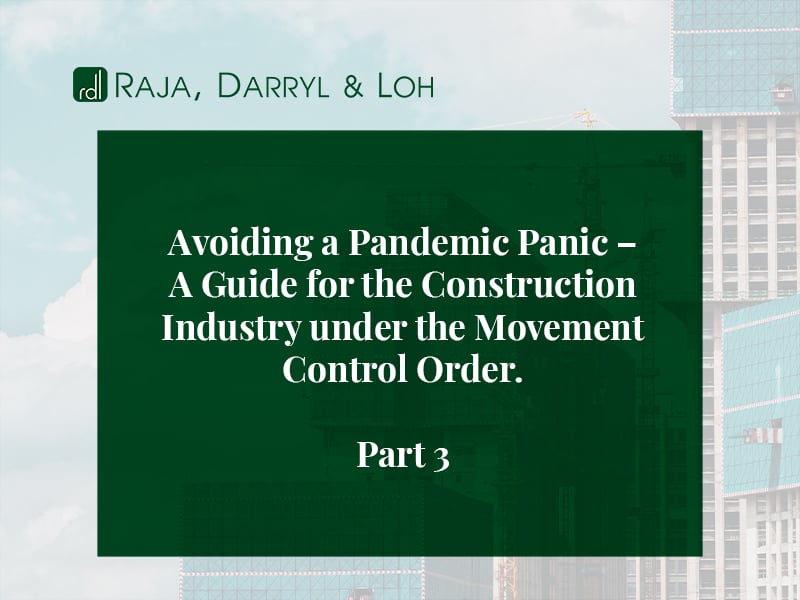Part Three – The Movement Control Order – does that fit into “Change in Law” provisions in construction contracts?
In Part 3 of our update, we will examine whether the MCO falls within the “change in law” provisions commonly found in construction contracts, with specific reference to the most commonly used standard forms in Malaysia – the PAM and PWD standard form contracts.
Change in Laws / Compliance with Changes in Law
Construction contracts may also have clauses dealing with changes in the law or compliance with governmental orders or directions which affect obligations of a party or its ability to perform the obligations under the contract. There may also be requirements for the contractor, subcontractor, owner, supplier or consultant so affected to issue notices and comply with requirements to mitigate. The contract may also stipulate who bears the risk of such changes and/or compliance with changes, and in some cases, the contractor may be entitled to seek an extension of time, or to claim for additional costs whether under the guise of loss and expense or variation.
The PAM Standard Form Contracts
In the standard PAM Contract 2006 (With Quantities), there is a requirement to obey laws. Clause 4.1 on Statutory Requirements states:
“The Contractor shall comply with and submit all notices required by any laws, regulations, by-laws, terms and conditions of any Appropriate Authority and Service Provider in respect of the execution of the Works and all temporary works.”
Under Clause 23.8 which lists the “Relevant Events” pursuant to which extension of time can be applied for, there are 2 provisions which may be relevant in the present context:
- Clause 23.8(p) (Clause 23.8(q) in the 2018 form) – compliance with any changes to any law, regulations, by-law or terms and conditions of any Appropriate Authority and Service Provider;
- Clause 23.8(w) (Clause 23.8(x) in the 2018 form) – suspension of the whole or part of the Works by order of an Appropriate Authority provided the same is not due to any negligence, omission, default and/or breach of contract by the Contractor and/or Nominated Sub-Contractors.
- In connection with Clause 23.8(w) in the 2006 form / (Clause 23.8(x) in the 2018 form, Clause 24 deals with claims for loss and expense. In both forms, compliance with changes to laws and suspension of works by authorities are potential grounds for claims for loss and expense.
Therefore, the enforcement of MCO, which obviously has the force of law which the contractor has to comply with, may fall within the “Relevant Events” that may entitle the contractor to apply for an extension of time, provided that all other requirements for extension of time are fulfilled.
The PWD Standard Form Contracts
In the standard PWD Form 203 (Rev. 1/2010) and PWD Form 203A (Rev. 1/2010), there is also the requirement to follow laws:
- Clause 10(f) requires the contractor to “inform the Government immediately in writing of the occurrence of any factor or event, which is likely to affect the Works …”.
- Clause 21.1 provides that the contractor shall comply in all aspects with any law, regulation or by-law, or any order or directive issued by any public authority.
- Specific provisions exist for “Epidemics” in Clause 77.1 which provides that “…In the event of any outbreak of illness of an epidemic nature, the Contractor shall comply with and carry out such regulations, orders and requirements as may be made by the Government or the local medical or health authorities for the purpose of dealing with and overcoming the same.”
- Clause 50 also allows for the Project Director to suspend works and, if this happens, for the contractor to claim an extension of time under Clause 50.2.
Similarly, in the standard PWD Form DB (Rev. 1/2010), the following apply:
- Clause 5.1 provides that the contractor shall comply in all aspects with any law, regulation or by-law, or any order or directive issued by any public authority.
- Clause 28 provides specifically for “Epidemics”, namely, that “… In the event of any outbreak of illness of an epidemic nature, the Contractor shall comply with and carry out such regulations, orders and requirements as may be made by the Government or the local medical or health authorities for the purpose of dealing with and overcoming the same.”
- Clause 59 likewise allows for the Project Director to suspend works and, if this happens, for the contractor to claim an extension of time under Clause 59.2.
- There seems to be no express clause in the PWD forms allowing for claims for extension of time or loss and expense due to a change of laws. It may be argued that while the duty to comply with prevailing laws remains, the risk as to any change in law has been assumed by the contractor.
While it may perhaps be said that the MCO has shifted the legal parameters within which the contract was intended to be performed and thus may amount to a change of law, and that the contractor had no choice but to adhere to the MCO as the contractor always has the duty to comply with the laws, whether that would give rise to a claim for extension of time and for costs is dependent on which party bears the risk of change in law under the contract. This is very much a question of interpretation of the contract, and the usual rules of contractual interpretation would apply.
It would also be prudent to note that the usual procedural requirements and conditions precedent to claims, for example, evidential or timeline requirements, are to be fulfilled or satisfied in order for contractual loss and expense claims to be sustainable.
Contributed by:
Joshua Chong (Partner)
(E): joshuachong@rdl.com.my
(D): 03-26329876
Chen Huan Yung (Associate)
(E): hychen@rdl.com.my
(D): 03-26329947
